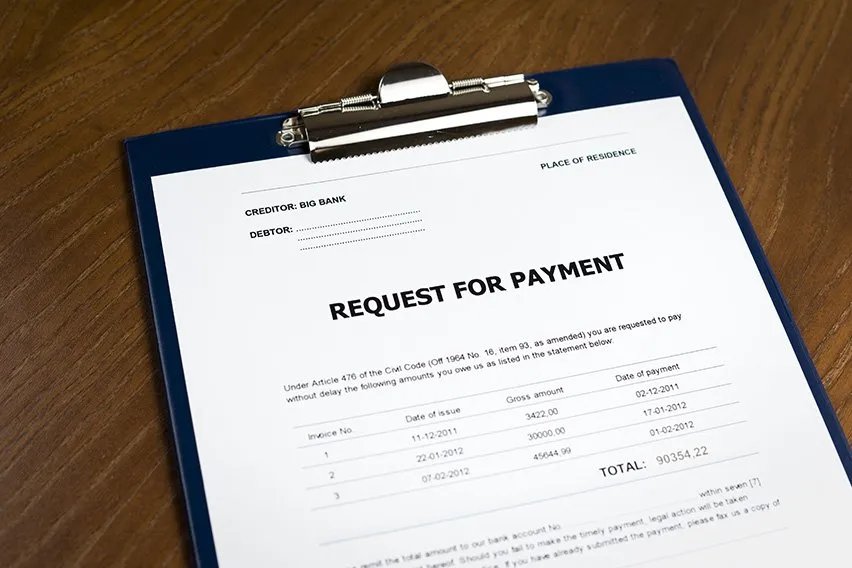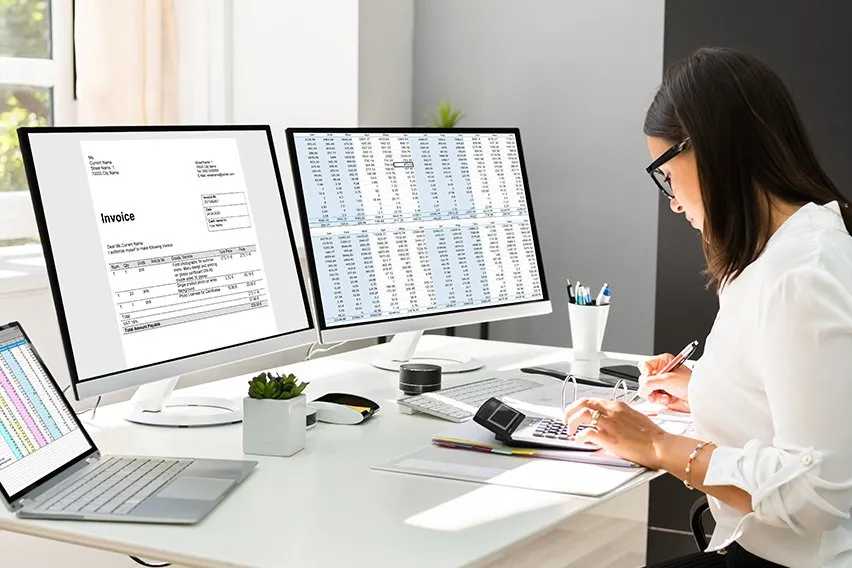How to Ask for Payment Professionally: With Templates and Examples

To ask for payment professionally, small businesses should always word their payment requests using polite but direct language. Give the client the benefit of the doubt and first ensure they received the invoice in question. Small businesses should follow up briefly by email to request payment and if the client still does not pay the outstanding invoice, the business should speak to the client by phone before considering cutting off future work for the client or taking legal action.
Explore these topics to learn how to ask for payment professionally:
How to Ask for Payment Professionally
Professional Payment Request Email Templates
How Do You Get Overdue Payment from Clients?
How to Ask for Payment Professionally
To ask for payment professionally from clients with unpaid bills, small businesses should follow these steps:
1. Check the Client Received the Invoice
To request payment professionally, it’s important to first make sure there was no error or miscommunication about the invoice. Send a polite email to your client explaining that the payment is now past due and ask to make sure they received the initial invoice and there were no problems with it.
2. Send a Brief Email Requesting Payment
If you don’t hear back from the client after your first check-in, or if your client acknowledges that they received the invoice but you still don’t receive prompt payment, follow up with a brief, professional email. Outline the invoice due date and how many days ago it was due. Remind the client of any late fees included in your payment terms, and let them know you’ll be charging interest on the overdue payment. Remind them of the different ways they can send payment, and reattach the original invoice to the email before sending it to the client.

3. Speak to the Client By Phone
It may seem awkward and intimidating, but if your email requests for payment don’t succeed in getting the client to pay your invoice, the best course of action is to get your client on the phone to sort out the underlying issue. When calling, identify yourself and explain calmly and politely that you’ve followed up multiple times by email about a late payment. If possible, try to secure payment over the phone by credit card or direct transfer. If that’s not possible, get a firm commitment on the date and method of payment. Remain professional and friendly throughout the call, thanking the person for their time.
4. Consider Cutting off Future Work
If the promise of payment that you secured by phone is not met by your client, or if you’ve had to chase down payment from this particular client several times before, you may want to consider cutting ties with the company and refusing future work. If you’ve already begun working on other projects, you may want to stop working before the project is finished, if you’re contractually able to do so. Cutting off work until you receive your payment can motivate your client to pay you quickly, so the work they’re relying on you for actually gets finished. Cutting off work can also protect you from future losses if you’re no longer confident the client is capable of or willing to pay you. Be courteous but firm when letting the client know you’re refusing further work. Explain calmly why you’re taking this step. Be aware that even if you handle this situation in a professional manner, it may upset the client and escalate tensions.
5. Research Collection Agencies
If your previous attempts at tracking down late payments are unsuccessful, you may want to escalate things further by hiring a collection agency to help you secure the payment from the client. Hiring a collection agency can be an expensive option, as they often take as much as 50 percent of the amount they collect from a debtor, but recouping some of the money can be better than getting nothing at all. Make sure you do your research and hire a reputable collection agency by checking out Better Business Bureau reviews of local agencies and by ensuring the agency is a member of the Commercial Collection Agency Association.
6. Review Your Legal Options
If, after all your attempts, you still aren’t able to secure payment from the client, it may be time to consider your legal options. If you have a legally binding contract in place with the client that outlines the work you were obligated to complete, the payment amount due and the deadline for payment and includes both your signatures, you can file a lawsuit for non-payment. For smaller outstanding invoices you can take the client to small claims court, or if the amount owing is greater, you can file a civil case against the client.
Professional Payment Request Email Templates
If you’re unsure how to write professional payment request emails to send to clients for overdue invoices, these templates can serve as an example:
First Email Payment Request Template
Subject: [Your Business’s Name]: Invoice #001 Past Due
Hi [Client’s Name],
I hope you’re well. This is a reminder that Invoice #001 was due on Thursday, November 30 and is now one day overdue. I know I sent the invoice at a busy time and want to ensure you received it. I’ve attached the original invoice to this email.
You can send payment by check or pay by direct transfer. Please let me know if you have any questions about the invoice.
Thank you,
[Your Name]
[Your Business Contact Details]
Second Email Payment Request Template
Subject: [Your Business’s Name]: Invoice #001 Past Due
Hi [Client’s Name],
I hope you’re well. I’m contacting you in regard to invoice #001. This is a friendly reminder that the payment was due on Thursday, November 30 and is now two weeks past due. Please send payment as soon as possible by check or direct transfer.
As per my payment terms, you will be charged a late fee of 2% per month for overdue payment.
I’ve attached the invoice to this email for your reference. Please let me know if you have any questions.
Can you please confirm that you’ve received this email? Looking forward to hearing from you.
Kind Regards,
Your Name
Your Contact Details

How Do You Get Overdue Payment from Clients?
To get overdue payment from clients, small businesses should be persistent yet professional in requesting the late payment. Small businesses should begin by following up by email to request the overdue payment from the client. If several attempts to secure payment by email don’t work, then follow up with the client by phone. Have a polite conversation about the overdue invoice and attempt to secure payment from the client by phone.
If those approaches don’t work, businesses should consider the following actions:
- Hiring collection agencies
- Cutting all ties with the client
- Filing a suit in small claims court
- Filing a civil lawsuit
To avoid late payments in the future, consider adding late fees to your payment terms, charging monthly interest for unpaid interest. You should also think about establishing legally binding contracts with all your clients before starting work on a project.
RELATED ARTICLES

 11 Construction Apps Builders Must Try In 2025
11 Construction Apps Builders Must Try In 2025 Can I Deduct Health Insurance Premiums? It Depends
Can I Deduct Health Insurance Premiums? It Depends How to Write an Invoice For Services Rendered
How to Write an Invoice For Services Rendered How to Send an Invoice: An Overview
How to Send an Invoice: An Overview How to Create an Invoice in Excel (Template Included)
How to Create an Invoice in Excel (Template Included) Invoice vs Receipt: What’s the Difference
Invoice vs Receipt: What’s the Difference